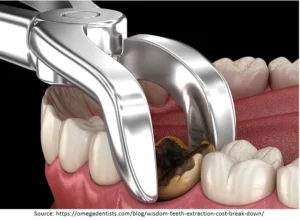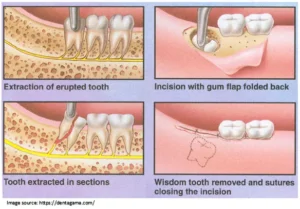
Simple & Surgical Tooth Extraction
- Have you been diagnosed with a dental infection?
- Is your tooth causing you any discomfort or pain?
If so, visit Neo Dental Care, a renowned dental clinic in Noida. And schedule an appointment with Dr. Suhrab Singh, our highly skilled and experienced dentist in Noida.
Tooth extraction may be necessary for various reasons, including severe dental infection, decay, or damage. Tooth extraction, one of the most common dental procedures, can help get rid of bacteria and enhance your overall oral health.
At Neo Dental Care, we provide safe and cost-effective simple and surgical tooth extraction in Noida to remove the diseased or damaged tooth and assist you in getting relief from dental issues like toothache, gum inflammation, etc.
To know more about tooth extraction, its procedure, and its benefits, read this informative article.
Overview of Tooth Extraction
Tooth extractions are dental procedures that involve removing decayed, damaged, or otherwise problematic teeth. At Neo Dental Care, one of the best dental clinic in Noida, we go above and beyond to protect your natural teeth. But occasionally, it is necessary to have a tooth extracted. We can replace the extracted tooth with a dental implant or oral prosthetic.

When is tooth extraction advised?
When possible, dentists prefer to preserve natural teeth. However, there are times when additional restorative measures, such as dental crowns or fillings, are required. Extraction may be necessary if your tooth is too severely damaged to be repaired.
If you have any of the following conditions, your dentist may recommend tooth extraction:
- severe dental decay
- damaged tooth
- broken tooth
- severe gum infection
- tooth luxation or another dental injury
- crowded teeth
How is tooth extraction done?
Whether your tooth is visible or impacted, your extraction will be simple or surgical.
Simple tooth extraction

Commonly, the dentist elevates the tooth with an elevator and grasps back and forth with dental forceps until the supporting alveolar bone and periodontal ligament has been sufficiently widened and broken to make the tooth loose enough to be removed. When teeth are extracted using forceps, controlled force is applied slowly and steadily.
Surgical tooth extraction

During a surgical tooth extraction, the surgeon may use a drill or osteotome to remove some of the jawbone tissue that is underlying and/or surrounding the tooth and bone. To make removal easier, the tooth is often broken into several pieces.
Recovery from Tooth Extraction
- After tooth extraction, recovery typically takes a few days. The steps listed below can help to ensure a quick recovery.
- After the procedure, apply an ice pack to your cheek to lessen swelling. Each time, use the ice pack for 10 minutes.
- Bite down to stop bleeding and promote clot formation after the dentist applies the gauze pad to the affected area. For the pad to be saturated in blood, leave the gauze in place for three to four hours.
- All medications, including over-the-counter pain relievers, should be taken as directed.
- For the first 24 hours, take it easy and rest. The next day, don’t start your routine right away.
- For the first 24 hours, refrain from using a straw.
- Avoid smoking.
- After tooth extraction, don’t rinse for 24 hours, and only gently spit.
- When you are lying down, raise your head with pillows.
- As usual, floss between your teeth, but avoid the extraction site.
- Eat soft foods the day after the procedure, such as yogurt, applesauce, and pudding.
- After 24 hours, rinse your mouth with eight ounces of warm water with a half-teaspoon of salt.
- You can gradually reintroduce other foods into your diet as you recover over the following few days.
Make an appointment with your dentist as soon as possible if you have pain that doesn’t go away after several days or symptoms of an infection, such as fever, pain, pus, or drainage from the incision.
Benefits of Tooth Extraction
- Tooth extraction has several benefits. Most importantly, it lessens the harmful bacteria that damage your gums and teeth.
- A decayed or damaged tooth can ruin your smile and lead to other issues if left untreated.
- Your best chance for achieving excellent oral health is to have your affected tooth extracted.
- Additionally, if your tooth is severely broken or infected, tooth extraction can help reduce dental pain right away.
What are the risks associated with tooth extraction?
Tooth extraction carries a small risk of complications, just like any surgical procedure. These include:
- infection
- dry socket
- nerve damage
- maxillary sinus perforation
- delayed recovery
Hearing that you need a tooth extraction is never pleasant. However, there are times when a tooth extraction is the most effective way to get rid of an infection and get your smile and life back on track.
If your dentist advises extraction, talk to them about replacement options. The appearance, functionality, and general oral health can all be restored with dental restorations like dental implants, dental bridges, or partial dentures.
